|
|
|
Sort Order |
|
|
|
Items / Page
|
|
|
|
|
|
|
| Srl | Item |
| 1 |
ID:
133127


|
|
|
|
|
| Publication |
2014.
|
| Summary/Abstract |
This article examines the main characteristics of mutinies in the Spanish tercios at the height of the Italian Wars (1494-1559), a surprisingly under-researched subject considering the high frequency of such upheavals in these core infantry units. Contrary to the severe legal and moral implications of modern military mutinies the dynamics of the mutinies in the tercios resembled more closely those of a modern workers' strike, in that the soldiers were allowed room to organize, make representations, negotiate and reach relatively amicable conclusions. Generals and soldiers alike accepted the recurring mutinies as a way of maintaining the organizational status quo in a context of infrequent paydays and persistent supply problems.
|
|
|
|
|
|
|
|
|
|
|
|
|
|
|
|
| 2 |
ID:
132412
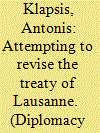

|
|
|
|
|
| Publication |
2014.
|
| Summary/Abstract |
In June 1925, General Theodoros Pangalos imposed his dictatorship on Greece. During his 14-month rule, he set as one of his basic foreign policy goals the revision of the territorial settlement imposed on Greece and Turkey by the 1923 Treaty of Lausanne. Wanting to secure Eastern Thrace and possibly even part of Western Asia Minor for Greece, Pangalos sought the backing of at least one Great Power with interests in the region, in this case Italy, as its dictator, Benito Mussolini, remained equally hostile and aggressive toward Turkey. Pangalos tried to reach an understanding with Mussolini concerning the possibility of joint Greco-Italian action against Turkey. The first signs of closer co-operation came in early July 1925 when the Italian under-secretary of foreign affairs, Dino Grandi, visited Athens for discussions with Pangalos. However, a more important initiative involved the official visit of two Greek ministers-Loukas Kanakaris-Roufos, the foreign minister, and Anastasios Tavoularis, the transport minister-to Rome in early March 1926. They met with Mussolini who, because of British pressure, now seemed reluctant about Pangalos' ambitious plans for joint action against Turkey. The Greek leader's hopes to revise Lausanne ended.
|
|
|
|
|
|
|
|
|
|
|
|
|
|
|
|
| 3 |
ID:
133418
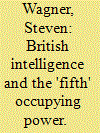

|
|
|
|
|
| Publication |
2014.
|
| Summary/Abstract |
At the end of the Second World War, British intelligence struggled to enforce strict limits imposed on Jewish immigration to Palestine. Holocaust survivors and Jews wishing to escape communism in Eastern Europe flooded the western Zones of occupation in Germany and Austria, while the Zionist movement worked to bring them to Palestine. Illegal immigration to Palestine was the key policy dispute between Britain and the Zionist movement, and a focus for British intelligence. Britain sought both overt and covert means to prevent the boarding of ships at European ports which were destined for Palestine, and even to prevent the entry of Jewish refugees into the American zones. This article highlights Britain's secret intelligence-gathering efforts as well as its covert action aimed to prevent this movement. It highlights a peculiar episode in the 'special relationship' between Britain and the United States, during which cooperation and partnership was lacking. British intelligence promoted a rumour that Soviet agents were using Jewish escape lines to penetrate Western Europe and the Middle East in order to persuade American authorities to prevent the movement of Jewish refugees. Instead, this article argues, American intelligence secretly cooperated with the Zionist organizers of the escape routes so to expose Soviet agents. Britain's attempt at deception backfired, and provided effective cover for the movement of hundreds of thousands of Jews during a critical period. Meanwhile its intelligence had dramatically improved, but policymakers failed to reassess Britain's ability to sustain immigration restrictions and the indefinite detention of tens of thousands of illegal migrants.
|
|
|
|
|
|
|
|
|
|
|
|
|
|
|
|
| 4 |
ID:
006195
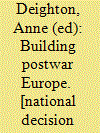

|
|
|
|
|
| Publication |
New York, St Martin's Press, 1995.
|
| Description |
xxvii,187p.; maps
|
| Standard Number |
0333626710
|
|
|
|
|
|
|
|
|
|
|
|
Copies: C:1/I:0,R:0,Q:0
Circulation
| Accession# | Call# | Current Location | Status | Policy | Location |
| 037917 | 320.94/DEI 037917 | Main | On Shelf | General | |
|
|
|
|
| 5 |
ID:
131446
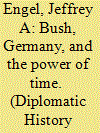

|
|
|
|
|
| Publication |
2013.
|
| Summary/Abstract |
George H.W. Bush backed German reunification with a puzzling degree of enthusiasm. His strategic reasoning was clear and not in dispute, as he desired to keep a unified Germany enmeshed within NATO. Less obvious, however, is his general forgiveness of Germany's past, for which he was pilloried. Yet history was much on Bush's mind in reaching these decisions. Germans had learned from the past, he argued. Europeans had not. They could not keep the peace no matter their ongoing political consolidation, his administration concluded by reading European history, without Americans in their midst. Bush backed unification, therefore, to ensure NATO's survival and thus an ongoing American presence on the continent. By studying Bush's sense of history, and a policymaker's historical sensibility more broadly, historians can thus gain greater insight into this decision and how strategic decisions are more generally formed
|
|
|
|
|
|
|
|
|
|
|
|
|
|
|
|
| 6 |
ID:
006737
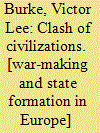

|
|
|
|
|
| Publication |
Cambridge, Polity Press, 1997.
|
| Description |
ix, 206p.
|
| Standard Number |
07745611982
|
|
|
|
|
|
|
|
|
|
|
|
Copies: C:1/I:0,R:0,Q:0
Circulation
| Accession# | Call# | Current Location | Status | Policy | Location |
| 038565 | 320.1094/BUR 038565 | Main | On Shelf | General | |
|
|
|
|
| 7 |
ID:
134068
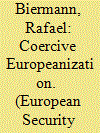

|
|
|
|
|
| Publication |
2014.
|
| Summary/Abstract |
Secessionism is still the predominant conflict type in Europe. Even though the European Union (EU) extended the enlargement perspective to the Balkans 15 years ago, secessionist ambition remains pervasive, especially in Bosnia, Kosovo, Macedonia and Serbia. How does secessionism affect Europeanization and how does Europeanization affect secessionism? It is argued here that in cases of unattained statehood domestic power struggles among deeply divided elites over status and territorial control undermine the consensus needed for Europeanization. In cases of attained de facto statehood the conflict focuses on recognition, which likewise polarizes societies and marginalizes reform. In such high-resistance scenarios, where the inclusionary EU norms clash with the exclusionary norms of the secessionists, the EU vigorously works to marginalize the secessionists by relying mainly on denial, punishment and imposition. Still, the EU's leverage is often insufficient in moving the conflicting parties towards within-state solutions and reform. A study of Bosnia's transformation since Dayton reveals, however, that the EU's leverage varies over time and that the EU at times itself inadvertently fans secessionism.
|
|
|
|
|
|
|
|
|
|
|
|
|
|
|
|
| 8 |
ID:
129465
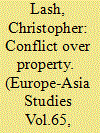

|
|
|
|
|
| Publication |
2013.
|
| Summary/Abstract |
This article examines housing conflicts during times of displacement in World War II and its aftermath. It looks specifically at the property experiences of eastern Poles in the western Polish town of Zielona Góra after forced displacement from the Soviet Union. It explores the intricate relationship between property and population displacement. By examining a micro-historical process at a time when property relations were in flux, we can investigate how displaced people negotiated spaces for themselves within a complicated set of realities. The article also adds to work done on state-society relationships in immediate post-World War II Poland.
|
|
|
|
|
|
|
|
|
|
|
|
|
|
|
|
| 9 |
ID:
068422
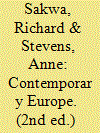

|
|
|
|
|
| Edition |
2nd ed.
|
| Publication |
Hampshire, Palgrave Macmillan, 2006.
|
| Description |
xvii, 308p.Pbk
|
| Series |
Palgrave foundations
|
| Standard Number |
9781403945675
|
|
|
|
|
|
|
|
|
|
|
|
Copies: C:1/I:0,R:0,Q:0
Circulation
| Accession# | Call# | Current Location | Status | Policy | Location |
| 051029 | 940.56/SAK 051029 | Main | On Shelf | General | |
|
|
|
|
| 10 |
ID:
130892
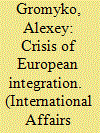

|
|
|
|
|
| Publication |
2014.
|
| Summary/Abstract |
Today, multipolarity and polycentrism are quantitatively and qualitatively different from their "prototypes" of historical periods of the past. Here it is necessary to single out three moments. First, Euro-centrism has been fading away in the past 20 years. Up to the 20th century, all the "concerts of powers" were based on the leading role of European states in international relations. Secondly, this new polycentrism is moving away from the straightforward dominance of the principle of force. The third moment, which characterizes the new-style multipolarity, is a phenomenon of international law that we have inherited from the 20th century.
|
|
|
|
|
|
|
|
|
|
|
|
|
|
|
|
| 11 |
ID:
130589
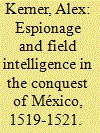

|
|
|
|
|
| Publication |
2014.
|
| Summary/Abstract |
Among the influential factors in the Spanish conquest of the Aztec empire in the sixteenth century, intelligence played a significant role. Information from field and diplomatic sources proved to have a decisive role in planning combat tactical moves as well as in the diplomatic and political contacts accompanying the military campaign. Both sides realized the importance of intelligence and used it as part of their military and diplomatic policies. This paper explores the types of intelligence sources and information-gathering systems available to the two sides in the fateful events of 1519-1521, and analyses intelligence's impact on the outcome of this momentous milestone in the New World's history.
|
|
|
|
|
|
|
|
|
|
|
|
|
|
|
|
| 12 |
ID:
027804
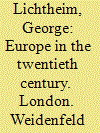

|
|
|
|
|
| Publication |
London, WeidenFeld and Nicolson, 1972.
|
| Description |
xiv, 409p.Hbk
|
| Series |
History of Civilization
|
| Standard Number |
0297994700
|
|
|
|
|
|
|
|
|
|
|
|
Copies: C:1/I:0,R:0,Q:0
Circulation
| Accession# | Call# | Current Location | Status | Policy | Location |
| 010982 | 940.288/LIC 010982 | Main | On Shelf | General | |
|
|
|
|
| 13 |
ID:
044122
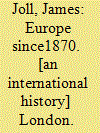

|
|
|
|
|
| Publication |
London, WeidenFeld and Nicolson, 1973.
|
| Description |
xiii, 541p.Hbk
|
| Standard Number |
0297765248
|
|
|
|
|
|
|
|
|
|
|
|
Copies: C:1/I:0,R:0,Q:0
Circulation
| Accession# | Call# | Current Location | Status | Policy | Location |
| 012662 | 940.287/JOL 012662 | Main | On Shelf | General | |
|
|
|
|
| 14 |
ID:
000438
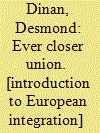

|
|
|
|
|
| Edition |
2nd ed.
|
| Publication |
London, Macmillan, 1999.
|
| Description |
xx, 596p.
|
| Standard Number |
0333732421
|
|
|
|
|
|
|
|
|
|
|
|
Copies: C:1/I:0,R:0,Q:0
Circulation
| Accession# | Call# | Current Location | Status | Policy | Location |
| 041749 | 341.2422/DIN 041749 | Main | On Shelf | General | |
|
|
|
|
| 15 |
ID:
030585
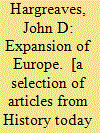

|
|
|
|
|
| Publication |
Edinburgh, Oliver & Boyd, 1968.
|
| Description |
160pPbk
|
|
|
|
|
|
|
|
|
|
|
|
Copies: C:1/I:0,R:0,Q:0
Circulation
| Accession# | Call# | Current Location | Status | Policy | Location |
| 004440 | 940/HAR 004440 | Main | On Shelf | General | |
|
|
|
|
| 16 |
ID:
133963
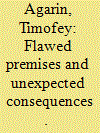

|
|
|
|
|
| Publication |
2014.
|
| Summary/Abstract |
This article discusses the relationship between three language communities in Europe with variant levels of official recognition, namely Kashub, Sorb, and Silesian, and the institutions of their host states as regards their respective use, promotion, and revitalization. Most language communities across the world campaign for recognition within a geographic/political region, or on the basis of a historic/group identity to ensure their language's use and status. The examples discussed here illustrate that language recognition and policies resulting therefrom and promoting official monolingualism strengthen the symbolic status of the language but contribute little to the functionality of language communities outside the area. As this article illustrates, in increasingly multilingual societies, language policies cut off its speakers from the political, economic, and social opportunities accessible through the medium of languages that lack official recognition locally.
|
|
|
|
|
|
|
|
|
|
|
|
|
|
|
|
| 17 |
ID:
005810
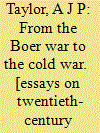

|
|
|
|
|
| Publication |
London, Hamish Hamilton, 1995.
|
| Description |
xv, 454p.Hbk
|
| Standard Number |
0241134455
|
|
|
|
|
|
|
|
|
|
|
|
Copies: C:1/I:0,R:0,Q:0
Circulation
| Accession# | Call# | Current Location | Status | Policy | Location |
| 036647 | 940/TAY 036647 | Main | On Shelf | General | |
|
|
|
|
| 18 |
ID:
032473
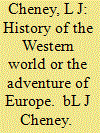

|
|
|
|
|
| Publication |
London, George Allen & Unwin Ltd, 1959.
|
| Description |
335p.Hbk
|
|
|
|
|
|
|
|
|
|
|
|
Copies: C:1/I:0,R:0,Q:0
Circulation
| Accession# | Call# | Current Location | Status | Policy | Location |
| 007909 | 940/CHE 007909 | Main | On Shelf | General | |
|
|
|
|
| 19 |
ID:
129444
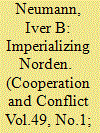

|
|
|
|
|
| Publication |
2014.
|
| Summary/Abstract |
The two pre-Napoleonic Nordic polities are best understood as empires. Drawing on recent analytical and historical scholarship on empires, I argue that 17th and 18th century Denmark, on which the piece concentrates, was very much akin to the other European empires existing at the time. Read in this light, national identities within the fragments of the empire appear similar. Nationalisms are all shaped directly on the Danish model, having at the same time Denmark as their constitutive cultural other. The introduction notes that, where all European imperial experiences are concerned, overseas territories had the most wounds inflicted upon them. We would not know this if we considered Faroese, Icelandic and Norwegian nationalism in isolation. These polities, Norway in particular, participated in and benefited from the colonial policies of the empire. This notwithstanding, their national identities insist that these nations were on the receiving - as opposed to the imposing - end of imperialism. This is a historically unwarranted and ethically problematic stance requiring further discussion.
|
|
|
|
|
|
|
|
|
|
|
|
|
|
|
|
| 20 |
ID:
132444
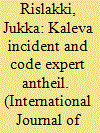

|
|
|
|
|
| Publication |
2014.
|
| Summary/Abstract |
An experienced U.S. code clerk was among the victims when the Soviets shot down a civilian Finnish passenger plane on a regular flight above the Baltic Sea in June 1940. It happened three months after the end of the Winter War between Soviet Union and Finland. Was the 27-year-old code expert Henry W. Antheil, and the diplomatic pouches and codes he was carrying, the reason for this attack?
Very belated, in May 2007, the name of Henry W. Antheil, Jr. was finally inscribed on a marble memorial plaque in the U.S. State Department's C Street lobby. 1 His career was cut tragically short on 14 June 1940, when his plane, the Finnish Aero airliner Junkers Ju 52 Kaleva was destroyed at 2:05 p.m. local time, shortly after taking off from Tallinn's Ülemiste airport en route to Helsinki.
|
|
|
|
|
|
|
|
|
|
|
|
|
|
|
|
|
|
|
|
|